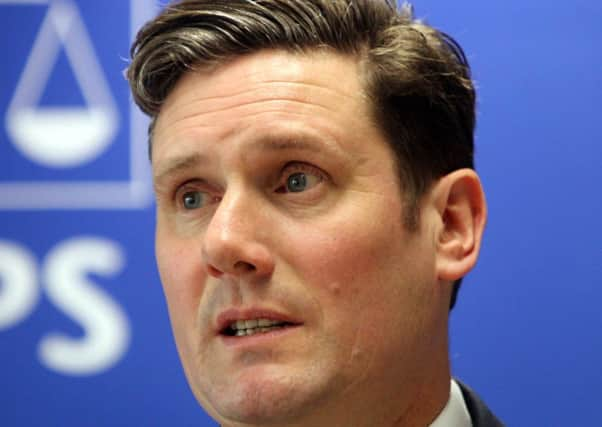Should Savile’s legacy be a legal duty to report abuse?


THE fallout from the Jimmy Savile scandal continues to be felt today, two years after the disgraced presenter died.
There are many people who never want to see his photograph, or hear his name, ever again. It’s an understandable reaction to a man whose despicable behaviour damaged so many young lives.
Advertisement
Hide AdAdvertisement
Hide AdBut shocking as the revelations have been, the Savile scandal has at least put the spotlight on child abuse and prompted a shift in attitude, with politicians and child protection experts alike agreeing that such horrendous behaviour should never be allowed to escape unpunished again.
One of the questions it has raised is whether failing to report allegations of child sexual abuse should be made a criminal offence in Britain. The former director of public prosecutions, Keir Starmer, believes it is time to “change the law” and says it should be “mandatory” for teachers and other professionals to report allegations.
Speaking on the BBC’s Panorama programme last night, Mr Starmer said it was time to “plug a gap in the law” that had been there for too long. “If you’re in a position of authority or responsibility in relation to children, and you have cause to believe that a child has been abused, or is about to be abused, you really ought to do something about it.”
He said a criminal penalty would “focus people’s minds” adding that there should be “immunity” for individuals if they did step forward. However, the Government has no plans to change the law – with the Department for Education stating that mandatory reporting is “not the answer.”
Advertisement
Hide AdAdvertisement
Hide AdNevertheless, there is pressure for Ministers to act. Abuse lawyer Liz Dux, of Slater & Gordon which represent more than 70 of Savile’s victims, says it is vital that lessons are learned and wants to see legislation introduced so that those in regulated activities who have direct knowledge of abuse and fail to report it will face prosecution.
“This will better protect people in the future. We owe this reform to the victims of abuse who have been failed in the past but remain courageous enough to speak out now.”
The call for legislation has growing support with the National Association for People Abused in Childhood (Napac), The Survivors Trust, Respond, Survivors UK and Innocence in Danger, all wanting mandatory reporting to be introduced in schools and similar institutions, where children are cared for.
Peter Saunders, chief executive of Napac, says it’s something they have wanted for years. “It’s about changing the culture and supporting professionals, it’s not about criminalising people.”
Advertisement
Hide AdAdvertisement
Hide AdHe says that whistleblowers need to be supported rather than being ostracized. “We don’t want a case where someone’s thinking ‘I’ve seen something but if I report it my career might be damaged.’ That shouldn’t be happening when it comes to child protection.”
However, Bernard Gallagher, a senior research fellow at the University of Huddersfield, doesn’t believe mandatory reporting for teachers and other professionals working with children is the best solution.
He points out that other countries, like Australia and the US, have introduced mandatory reporting and there is no evidence to show that it’s made any difference.
Dr Gallagher, who specialises in child protection, has concerns about the “unintended consequences” of any changes to the law. “The police and social services are already very busy and this would weigh them down even more, making it difficult to sift through the genuine cases against the unfounded ones.”
Advertisement
Hide AdAdvertisement
Hide AdInstead, he wants to see greater resources given to the police and social services to do their work more effectively and that all children should be receiving better sex education in schools. “How can they report child abuse if they don’t know about sex?”
Dr Gallagher believes that we also need to look at whether access to so-called “lads magazines” and semi-naked pictures of girls in some of the tabloid newspapers needs to be restricted.
He feels too many people have become fixated with the idea of mandatory reporting when the issue of child abuse is “much wider and complex”.
“We need far more radical measures rather than focusing on mandatory reporting,” he says. “The vast majority of [child abuse] cases happen in and around the family and any mandatory reporting law should apply to everyone, but people don’t want to grasp that nettle.”